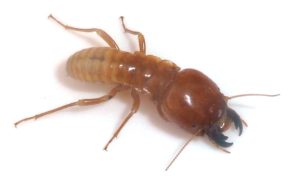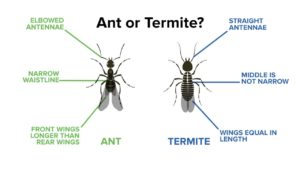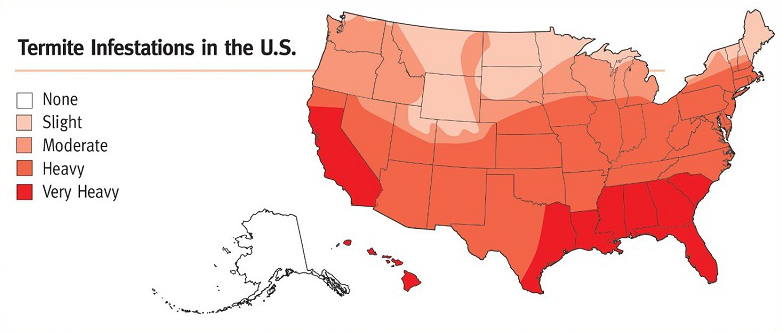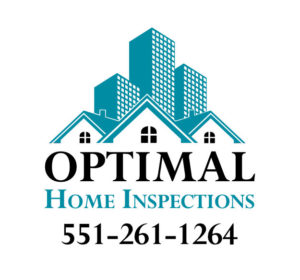When inspecting for termites, hire a termite expert. That’s exactly what Optimal Home Inspections is, NJDEP License #61282B, and that is what you get with every NJ home inspection plus Termite inspection. Not only will the inspector look for termites but will also do a complete Wood Destroying Insect (WDI) inspection. The termite plus inspection is a complete home inspection that includes not only termites but carpenter ants, powder post beetles, carpenter bees, etc.
With every termite inspection, you will receive a Wood Destroying Insect Inspection Report (Form NPMA-33), which is acceptable to all VA, FHA, and conventional certifications to all lending institutions. Note: this form can only be signed by a NJDEP licensed commercial applicator with the Termite & other wood-destroying insects category certification.
Common Questions

What are termites? For simplicity of explanation, termites are wood-eating insects with nests in the ground. They love damp wood and are usually found in the lower part of the house, particularly in the sill plates, which is the first structural section of wood closest to the ground.
Can one see termites? Are they like ants? The average homeowner never sees a termite. The simple reason is that the worker termite that eats the wood cannot live in the sunlight and air. To survive, the worker termite must: (a) stay out of the sunlight and air; therefore, they stay in the shelter of the wood, out of sight, (b) they must return to the soil for moisture quite frequently, and they do this by building mud tunnels to stay out of sunlight and air. For these reasons, it takes the practiced eye of a professional termite inspector to know where to look and probe the wood to locate the termites and then break open the wood to expose the termites.

Are there any termites in New Jersey? The bad news is, that New Jersey has an abundance of termites. The good news is that they can be controlled and eliminated very effectively with proper treatment.
What does the termite treatment involve? The best method to treat termites is with a chemical barrier between the house and the ground. The barrier prevents new termites from entering the house, and when the ones already in the house return to the ground for moisture, they too will perish from the treatment. In other words, there is a very effective method of getting rid of termites, but the treatment and repair costs could be expensive.
How much does it cost, and who pays? The cost depends on the size of the house and the difficulty of the treatment. For example, with a small cape cod style house, the treatment cost would range between $450 and $550. The repair cost is another matter. The repair cost depends on the extent of the damage.

Who pays? Normally the seller of the house pays for both the treatment and repair costs. The reason the seller pays is for a very good reason. I know of no mortgage company that will give a mortgage for the purchase of a house unless it has a clear termite certification from a licensed termite company. The certification must state there is no termite infestation and if there was any termite damage that it was repaired properly, and the company that completed the treatment and repairs gave a one-year guarantee to the buyer for both the treatment and repairs.
Good news! Because mortgage companies insist on a clear termite certification for every mortgage, the damage is minimal. The average house is resold several times in its lifetime, and every time it is sold, the termite issue is addressed. This factor keeps termite damage to a minimal level. I am not saying that there are no houses with serious damage, but these houses are the exception, not the norm. From our experience, the average house with termite damage has a repair figure between $200 and $1500.
Advice to first-time buyers. Don’t lose the purchase of a good house because it has termites. Most houses in New Jersey will have some termite or carpenter ant infestation. A professional termite company can repair any damage like new and treat the property against further infestation. I personally know several first-time buyers that turned down good deals because of a mindset against termites.
What if Termites are Discovered?
USING THE SELLER’S TERMITE INSPECTOR’S REPORT—It is quite common for the seller to have a termite service that performs an annual inspection for termites and treatment. With this kind of service and a guarantee against termites, it’s only logical to accept the seller’s termite certification that the property is free of any wood-destroying insects. With a written guarantee, one would assume the following: the property is free and clear of termites. And the property has no termite damage. These assumptions have cost many buyers dearly in terms of money, time, and aggravation. To avoid termite problems, we suggest that the buyer always hires his own independent termite inspector to inspect the property for wood destroying insects and wood damage.
THE SELLER’S TERMITE COMPANY—Optimal Home Inspections always conduct all our own termite inspections. We perform our own inspections for good reasons: (1) New Jersey has an abundance of termites whereby half the houses over twenty years old have some form of a termite problem, and (2) To protect the buyer, we want the lower wood section of the property probed for termites by a professional termite inspector. Over the years, we have found properties that were covered with a termite service contract had not only termites but also wood damage. When this situation is discovered, the seller’s termite company is obligated to make the necessary termite treatment and repairs. And, if the seller’s termite company overlooked termites and repairs first, what kind of repairs will they perform?
BUYER’S PROTECTION AGAINST TERMITE PROBLEMS—When termite treatment and repairs are required, the buyer should always have his termite company check the property after the repairs are completed. To inspect is to assure that the job has been done properly. The last thing a buyer wants is to accept a certification from the seller’s termite company that the property is free of termites, and all repairs have been completed and then find out over a year later that the property still has termites and wood damage. When this happens, the termite problem and expense usually get transferred to the buyer because it’s very difficult to prove that the termites were there before the closing. The seller and the termite repair company will say that the property was free and clear of termites and that there was no damage when the property was sold.
WHAT ABOUT THE ONE-YEAR GUARANTEE—A guarantee is only as good as the company giving the guarantee. Most termite companies guarantee that the property will be free of termites and damage for one year after the inspection. Even if the seller’s termite company is reputable, the buyer still has the job of dealing with the company and getting the job done properly if termites are discovered after the closing of the property.
How to Avoid Termite Trouble
- Keep water away from the house. Termites love moist wood.
- Do not store wood on the ground near the house, particularly under the deck or porch. When one stores wood in these areas, they set the dinner table for termites.
- Keep firewood away from the house and only bring it into the house when you will burn it immediately. It is very unlikely that termites brought in with firewood will start an infestation because their moisture route to the nest has been broken. However, if you store firewood in the house, you could bring in a host of another type of insects that could be pesty.
- Inspect the garage and house foundation for small mud tunnels going from the ground to the wood.
What About Service Contracts?
All termite companies sell a yearly service contract for a fee normally under $200. The contract is a guarantee against termite infestation. They will inspect the property once a year and if termites are found there is no cost for the treatment or repair.


